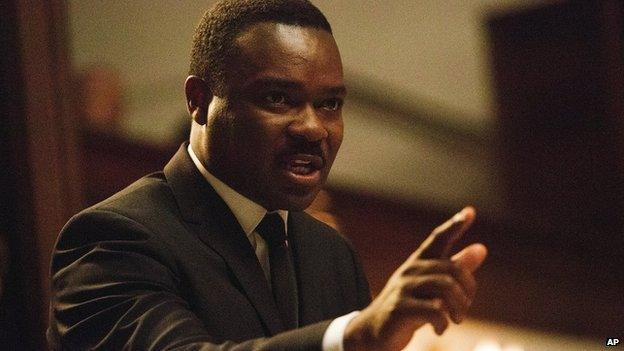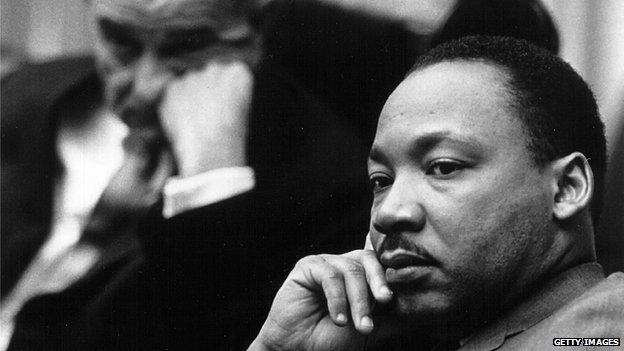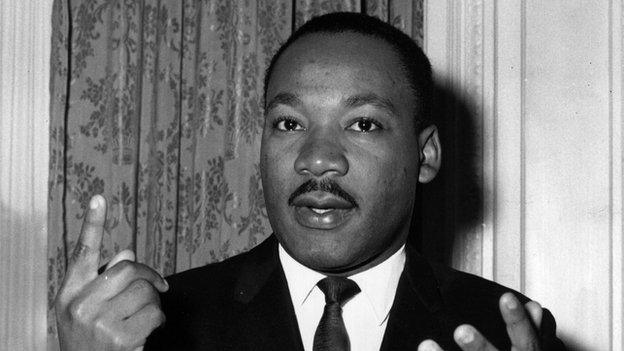Critics say Selma gets MLK and LBJ wrong
- Published

David Oyelowo portrays Martin Luther King in the film Selma
While the film Selma may be about the 1965 voting rights marches in Alabama led by Dr Martin Luther King Jr, its portrayal of then-President Lyndon Baines Johnson as an obstacle to the civil rights movement has spawned controversy.
A presidential legacy, it seems, is a very touchy subject - at least, for former aides and interested historians.
Some have said the film negatively casts the president, who died 41 years ago, as reluctantly standing by while activists marched and Congress passed the landmark Voting Rights Act of 1965.
"What's wrong with Hollywood?" laments, external Joseph A Califano Jr, who served as Johnson's top aide for domestic affairs.
Drawing particular fire are factual inaccuracies such as a scene where Johnson asks the director of the FBI at the time, J Edgar Hoover, to discredit King. The president also is shown green lighting a decision to send King a tape recording of the civil rights leader engaging in an extramarital affair.
Later, the movie implies that MLK missed the first Selma march because he was busy trying to repair his marriage after his wife had listened to the tape.
While the FBI did monitor King at the time - and did send a threatening letter to his house that hints at an audiotape - the film takes artistic license with both the timeline and LBJ's involvement.
"In fact, Selma was LBJ's idea, he considered the Voting Rights Act his greatest legislative achievement, he viewed King as an essential partner in getting it enacted - and he didn't use the FBI to disparage him," Califano writes in an opinion piece for The Washington Post.
He says the movie is so far off the mark that it should be "ruled out this Christmas and during the ensuring awards season".
Mark K Updegrove, an author, historian and the director of the LBJ Presidential Library, agrees, external.
Writing for Politico, Updegrove says films based on true events often massage the truth in order to create a better narrative, but historians should step in when that narrative doesn't represent the spirit of what actually happened.
When it comes to Selma, he thinks the filmmakers misrepresented the relationship between King and LBJ.

Selma's critics say Martin Luther King Jr and Lyndon Johnson worked together for civil rights
"In truth, the partnership between LBJ and MLK on civil rights is one of the most productive and consequential in American history," he writes.
Updegrove cites a 1965 taped phone conversation between the pair, where Johnson encourages King to publicise the worst example of voter suppression as a way to prompt a national discussion and boost legislation being considered by Congress.
"If you just take that one illustration and get it on radio, get it on television, get in the pulpits, get it in the meetings, get it every place you can; pretty soon, the fellow that didn't do anything but drive a tractor will say: 'That's not right, that's not fair.' And then, that'll help us in what we're going to shove through in the end," Johnson says.
But Breitbart's Roger Stone and Phillip Nelson charge, external that Updegrove is sanitising the relationship between the two men.
Instead, Stone and Nelson say, Johnson was a life-long segregationist who worked against the civil rights movement for years. It was only when the president found himself in the Oval Office that he saw the benefit of supporting the civil rights agenda.
"Johnson's embrace of civil rights is apparently not based on a moral principle; even when LBJ does the right thing, he does it for self-interest, as part of his plan to create a grand legacy for himself," they write.
Outside of the actual historical debate, Vox's Matthew Yglesias writes, external that the criticism of Johnson's portrayal goes beyond the scrutiny that biopics like Selma normally receive. Instead, he says, it seems that the criticism comes from the fact that the film doesn't make LBJ, a white man, the hero of the Voting Rights Act.
He disagrees with the idea that Johnson is negatively portrayed in the film. Instead, he says, King and his associates are the key actors, while the president is on the sideline.
"The idea that a film should be ruled out for having the temerity to focus on black people's agency in securing their own liberation is completely absurd," he writes. "We've had too few such films in American history, and everyone could stand to watch some more."
But while most critics see Johnson as the victim in Selma's version of the story, Josh Zeitz writes, external for Politico that Selma is equally damaging to King. Even Yglesias misses the mark, he says.
"The controversy over Selma should not be reduced to a debate about whether black activists exercised political agency," he writes. "Of course they did. The deeper problem is that the movie doesn't always get its portrayal of black activists right."
Zeitz says that the film is "oddly patronising" in the way it deals with black student activists. Often, he says, they are seen as well-meaning hotheads often working against the movement. Instead, the reality is that King co-operated with student groups because they were unconventional, not in spite of that.
While it's often easier to understand historical events as a struggle between good and evil, the truth tends to be more complex.
(By Kierran Petersen)
- Published19 November 2014
